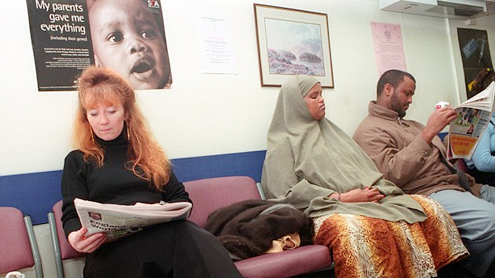
The full impact of mass immigration on British life was laid bare last night by a Home Office report.
It said that half the population lives in a town or city which has experienced high levels of immigration over the past decade.Ministers said this ‘uncontrolled’ flow had caused a number of problems for wider society, ranging from pressure on maternity services, high rates of infectious diseases and a squeeze on school places, to disproportionate levels of some types of crime, inflated rents and immigrants living in ‘beds in sheds’.In the landmark report, Home Office researchers studied every one of the 348 local authority areas in the country.
Each was examined to see if it had accommodated high levels of asylum seekers, low-skilled workers, foreign students and other migrant groups.Overall, migration was found to have had a major impact in 127 of the areas, covering half of the total population. These ranged from areas of London used to coping with large influxes of newcomers to small market towns.The report was published as ministers promised tough action to reduce the ‘pull factors’ that draw migrants to Britain.
Landlords will be fined up to £3,000 if they rent a property to an illegal immigrant. Homeowners who simply rent out a spare room to them could be fined £80 for a first offence.Non-EU migrants will be expected to pay a health levy of £200 a year to access the NHS if they do not have private healthcare.There will be an extra charge for maternity care and sick migrants could even be denied access to organ transplants.Immigration Minister Mark Harper said: ‘This report highlights the significant impact high levels of migration have had on UK communities.
‘It emphasises the importance of protecting our public services and taking a robust approach against those who come here to exploit our welfare system.’The report – titled Social and Public Service Impacts of International Migration at the Local Level – says that every year since 1998 net migration has been above 100,000, peaking at 255,000 in 2010.In only seven years, between 2004 and 2011, the number of Poles living in the UK leapt from 69,000 to 687,000.The report studies the impact different groups of immigrants are having on health, education, social services, housing, policing and the jobs market.
While acknowledging the hugely important work carried out by foreign doctors and nurses, researchers revealed a string of pressures on the NHS.They said that, in a single year, 73 per cent of TB cases reported in the UK, almost 60 per cent of newly diagnosed cases of HIV, and 80 per cent of hepatitis B-infected UK blood donors were from those who were born outside of the UK.It also says foreign-born women are having more children, an average of 2.28 each compared to 1.89 for UK-born women.Experts questioned by the Home Office agreed the ‘high birth rates of some migrant groups produce additional demands on midwifery, maternity and health visiting services’.
Health staff said that appointments and visits could take twice as long where patients had poor English, putting significant pressure on other workloads.On schools, it said the presence of some groups of migrant children had helped to drive up standards, but warned that some areas were finding the ‘churn’ of pupils hard to cope with.Researchers also said that, in some areas, ‘demand for primary school places outstrips, or almost outstrips, supply’ for migrant children.Social services said that ‘interpretation costs for migrants who cannot speak English are high due to the need for confidentiality and accuracy’.
In housing, large numbers of low-skilled migrants wanting to rent in the private sector is driving up prices. Researchers warned of ‘inflated rents, unregistered houses of multiple occupation, exploitation by unscrupulous landlords, waste management and pest control issues that can quickly spread’.They also highlighted the problem of so-called ‘beds in sheds’.Yesterday, seven men including illegal immigrants were arrested in West London as part of a series of immigration raids on properties where migrants were living in out-houses.
On crime, the study found that some groups, such as failed asylum seekers who could not be sent home and jobless eastern Europeans, were ‘disproportionately involved in crimes like shoplifting and disorderly behaviour’.However, it added that destitute Britons were also likely to be ‘disproportionately’ involved in these offences.Police said it was clear that some migrants who entered the UK on a student visa were not actually studying and were instead working illegally.On jobs, researchers highlighted findings by the Government’s Migration Advisory Committee of the potential for migrants to displace non-migrant labour.MAC found that for every 100 non-EU workers employed in the UK, the number of UK workers fell by 23.Mr Harper said net migration had now been reduced to 163,000 a year, and added: ‘If we do not implement the proper controls, communities can be damaged, resources will be stretched and the benefits that immigration can bring are lost or forgotten.’ – DailyMail












